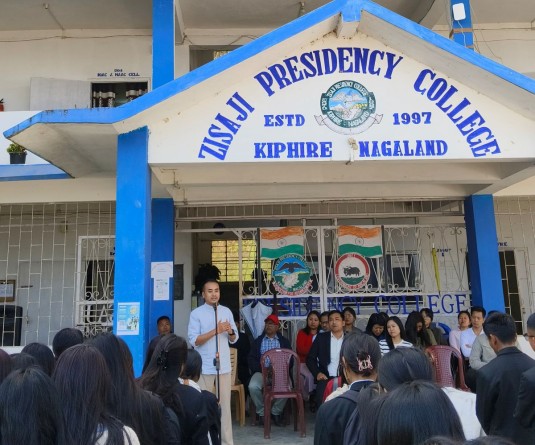Dimapur, October 14 (MExN): On October 15, UN commemorates the International day of Rural Women and in the country as National Women Farmer’s Day recognizing the crucial role they play in ensuring food and nutrition security for both rural and urban communities; improving rural livelihoods and overall wellbeing of their communities.
In the context of Nagaland, farmers, particularly women have been playing a significant role in the conservation of genetic agro-biodiversity through traditional forest based agricultural practices, jhum and terrace agriculture, homestead gardening, seed saving and sharing.
Despite progress on many fronts, “due to structural barriers and discriminatory social norms,” women and girls in rural Nagaland lack equal access to and control of productive resources and assets; their voice, agency and representation in the political and economic spheres continue to be hindered. Their access to infrastructure, services and social protection also remains a huge challenge, stated a press release from Rutho Nyuwi (Project Associate), NEIDA Nagaland.
Mahila Kissan Adhikaar Manch (MAKAAM), a forum for women farmer’s rights, shares few stories of women farmers who have significantly contributed to the communities in their capacities. In Nagaland, the forum comprises of organizations and individuals including NEN, NEIDA, RBA, CWWS, FPO Kohima, SEWA and others.
Pushing forward community for food security
Bounuo Zuyie from Rusoma village under Kohima district is a famer and vendor besides being a mother and wife. She is also a member of SEWA Nagaland – a collective of women workers in the informal sector, and a leader in her Rusoma unit.
She has been actively working at her capacity to guide and provide linkages and entitlements to the marginalized women in her community.
During the lockdown, the famers and vendors’ transaction came to a standstill. There was a total restriction beyond the village gates.
Bounuo knew and understood the plight of both, how the vegetables will go waste if the vegetables did not find a market soon and the vendors in town were desperately in need of local suppliers to earn a dignified income.
The news of the Kohima Municipal Council (KMC) providing a designated place for vendors to sell their products came as relieve for many vendors in Kohima town, but not enough to accommodate all.
Knowing there were many farmers needing a market for their produce, Bounuo took the decision to help with linking the farmers to the market. She collectivized the produce from women farmers at Rusoma, contacted some of the vendors at Kohima, and with the permit (issued by KMC through the assistance of SEWA Kohima). She made as many trips as possible to Kohima to sell the produce.
In the last 4 months, she made weekly trips to Kohima, sometimes making a decent profit sometimes barely making up the fuel cost.
“I asked my husband to drive me to Kohima since the hire cost was too high and it was impossible to make a margin if we were to hire. My husband has been very supportive. Together we did our best for ourselves and also to help our community,” Bounuo shares.
There were 30 families approximately from whom Bounuo collected the produce providing a stable income for the families during the difficult time. “Alone I could have done nothing; it was people’s faith in me that helped to find a way out.”
Another initiative of Rusoma village is the Friday Bazaar which Bounuo and her fellow farmers are a regular. “When the village council took up the initiative, the first one on their mind was to invite the SEWA members. I am so happy that now the village authorities also recognize our women’s union,” she shares with excitement. It is another feat for the SEWA Rusoma unit, which is only the beginning of a new chapter.
Pig rearing enterprise
Tsusangshe is a middle aged women, mother of four from Phuvkiu village from Kiphire district who rears pigs as a as a source of income. Pig rearing as an enterprise has been promoted by NEIDA in the district.
“It helps to meet the household expenses and most importantly for children’s school fees,” says Tsusangshe. Shares her experiences in rearing pigs Tsusangshe says, “The knowledge she has gained on the importance of pig management, feeds, and sanitation of Pig sty and to rear improved breed has helped her a lot.”
The profit earned from piggery leaped up to Rs 1,45,000 from the sale of piglets as compared to earlier where her income was just about Rs. 15,000 from sale of fattened pigs. At present, she and her husband are rearing two breeding sow and four fattener. Their families have also increased their agricultural land to 3 acres for growing maize to be used as pig feeds.
She expects to earn more than 3 lakh per annum from selling of piglets in the next 5 years. She wants to increase pig stock however due to financial problem and cash required for children’s education and home maintenance she has not been able to.
The pandemic has not affected their pig rearing and agricultural activities and have been able to carry out their normal farming operations in the village.
Turning hardship into opportunity
Kalinliu Dangmei of New Jalukie village under Peren district stayed in a rented place in Kohima and earned her living by selling green vegetables. With the lockdown, she had no other alternatives for supporting her family. She changed her daily occupation and started collecting bamboo shoots.
Her activity greatly helped other women in the village in generating daily income. She purchased all the bamboo shoots brought by the women farmers who had no more scope for marketing during the pandemic.
Also, cultivation of King Chili brought huge profit for Dungki village women farmers. They produced not less than the average of 400 to 500 Kg with an annual turns over of Rs. 80,000 per farmers.
Kalinliu initiated to take up the work of collecting jungle products especially bamboo shoots and King Chili from the poor women farmers.
“My daily activity of collecting King Chili and fresh Bamboo shoots and also fermenting the shoots would now valued not less than Rs 3,00,000 (three lakh) when it will be sold out again in the higher markets like in Kohima and in Dimapur.
Although pandemic had brought about a great disaster in my former business, yet I live contented with the hope of this sum assured amount of which I began to materialize very now and then after the Unlock-4 which permitted all sectors to run their business under certain SOP rules,” Kalinliu shares.
Apart from gathering food from the forest, New Jalukie women folk are also involved in paddy transplanting in the respective wet terrace fields and often go for daily wages. The average amount of saving through daily wage labour comes to about Rs 6,000 to 8,000 approximately per individual. Some women managed their family by this earning while many others preserved the sum amount for purchasing paddy when harvest is done.
‘Food security lies in our fields’
Neikotsou Chirhah (Neikou), a single mother of four children residing in Chizami village under Phek district is a farmer-vendor-weaver, works with NEN Nagaland and is also a member of SEWA Chizami Unit.
She harvests vegetables from her jhum fields, kitchen garden, goes door to door selling the produce, and finishes her business before many begin their day.
As a self-sufficient farmer, Neikou provide for herself and family. She manages her children’s educational expenses selling the surplus produce and income from her little shop. She continues practicing the traditional way of farming- multi-cropping, maintaining diversity in her fields, so that she will always have something to harvest. During winter season, she forages wild vegetables.
When asked how she managed during the lockdown, with a heavy sigh she shares, “During the pandemic, I did not open my shop for months or go to the weekly bazaar but I had my fields. I still have another source of sustenance and I cannot imagine if I did not have the land.”
Her family was no exception to the rippling effects of the nationwide lockdown yet she is glad that there was no restriction on agricultural activities. “We were allowed to go to our fields but we could not hire extra hands to help us. The family had to manage it,” she adds.
With the closure of all economic establishments, there was no other means to procure seeds, which was another challenge. Neikou is disappointed that this year she could not plant cabbage sapling like the previous years.
“This year I will not harvest any cabbages.” When asked what ‘no cabbages’ meant for her as a farmer, Neikou says, “I used my own locally preserved seed to grow most of my food. I still have enough to eat and sell. Cabbage is to feed the local demand. I am hoping to harvest more local food this year.”
On the brighter side, Neikou could sell more local produce this year. “I got to sell much more during the lockdown. People would call and asked to buy my produce. I was able to cater to the demands of the people and since I always grew variety in my jhum fields and this was a great advantage for me.”
For Neikou, the biggest challenge as a farmer is the changing climate, unpredictable weather, uncertainty of yield. “I work hard tending the crops but the ultimate results depend on the favorability of the weather,” she states.
Neikou encourages the fellow villagers to grow one’s own food and adds, “when I see fields empty, it pains me to see the land going waste”.
“The biggest lesson for me this year is the value of growing our own food, using our own seeds and not being market-dependent. Food security lies in our fields,” shares Neikou.





